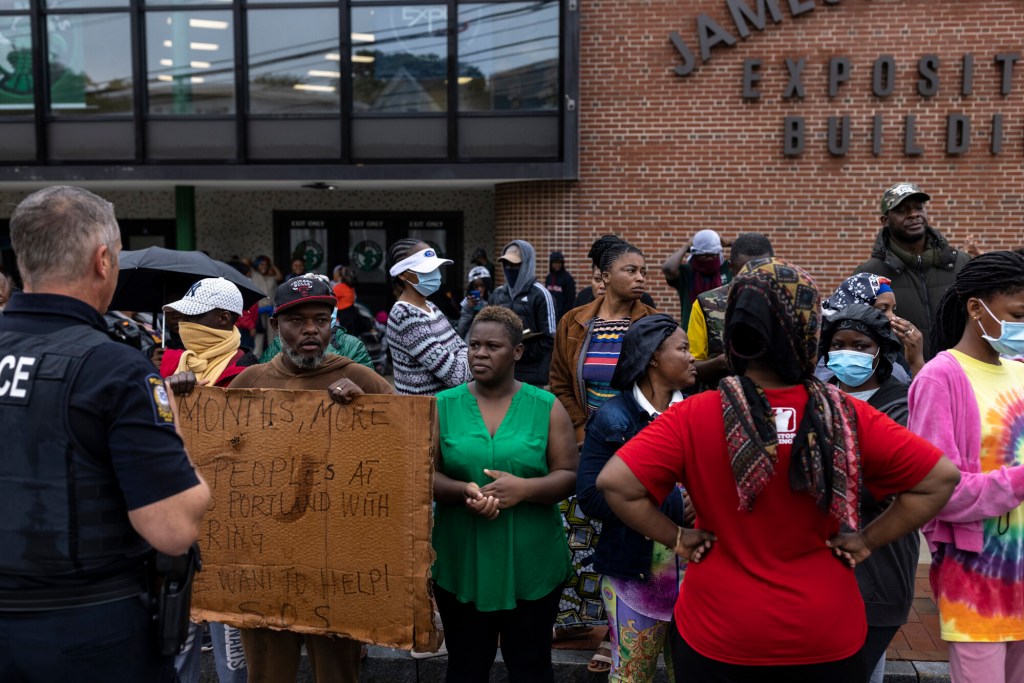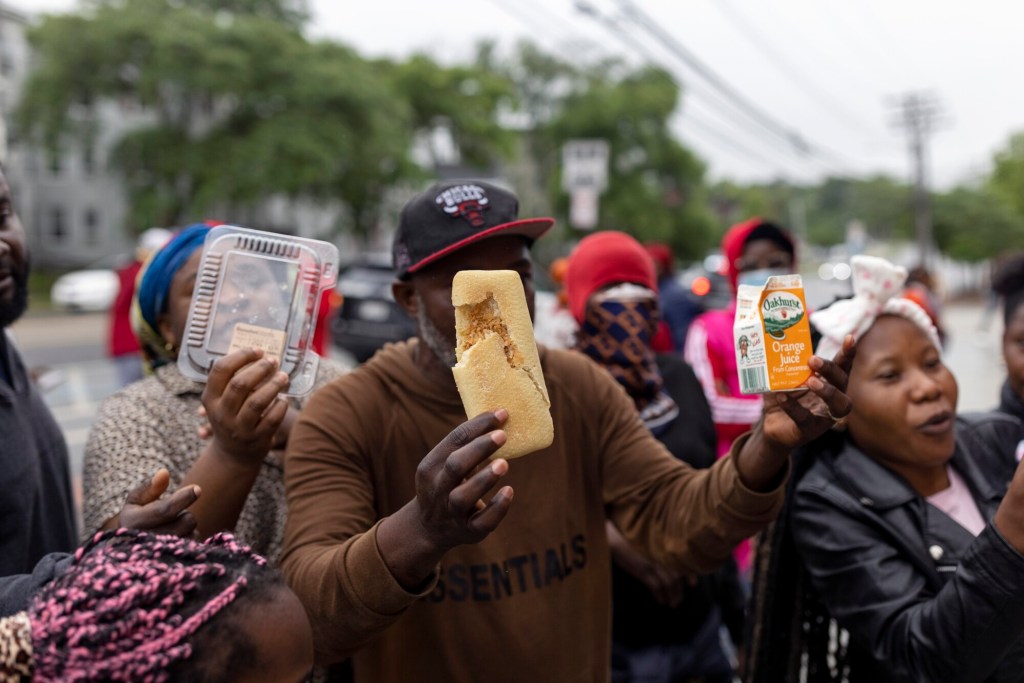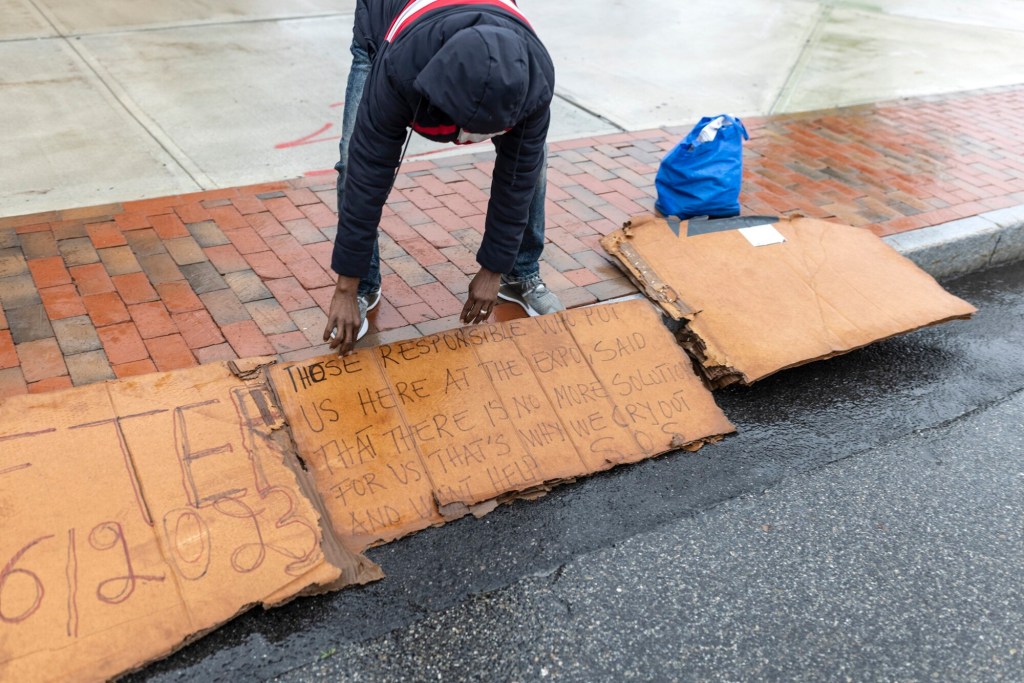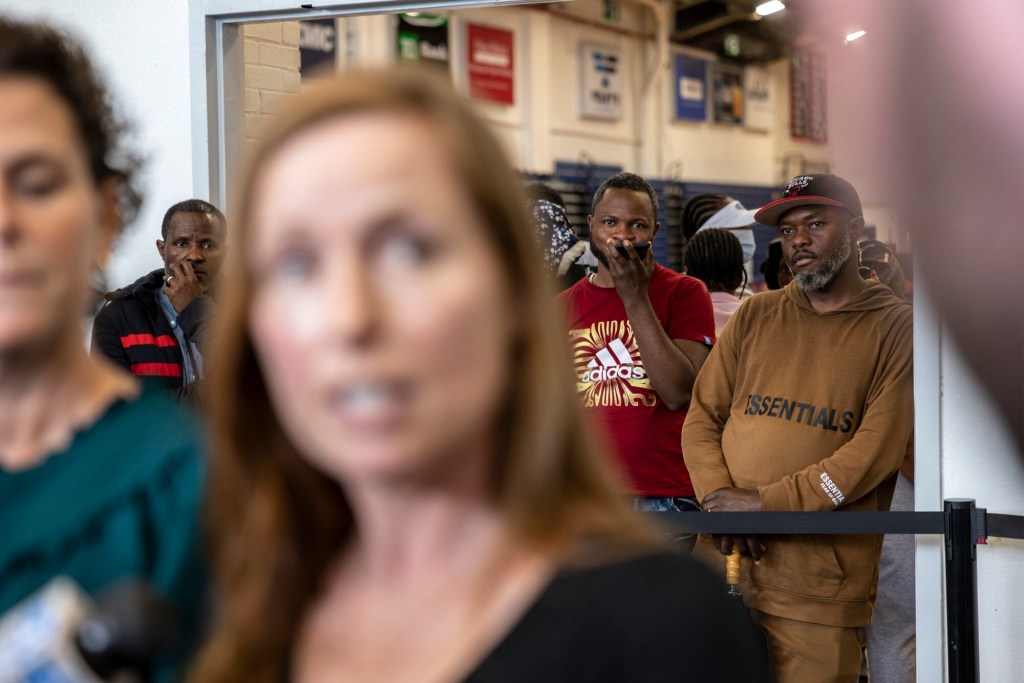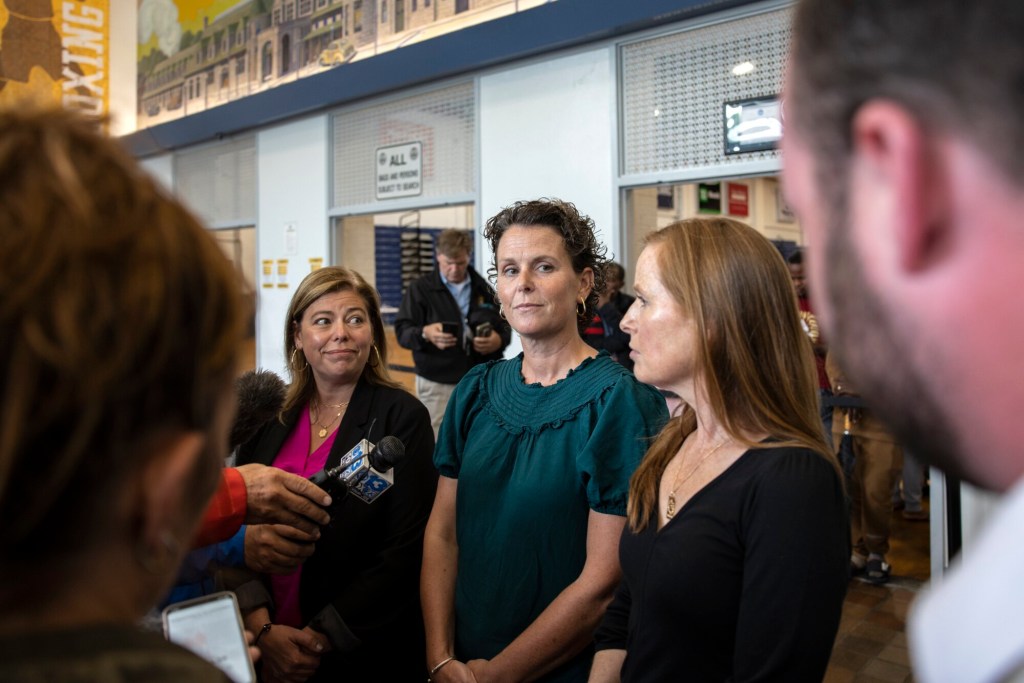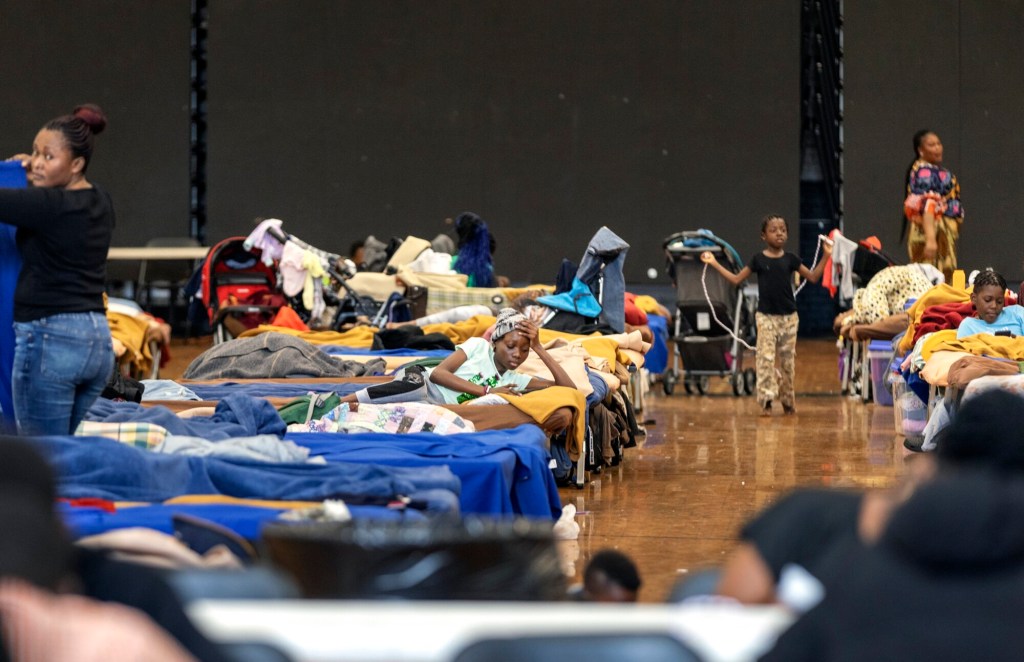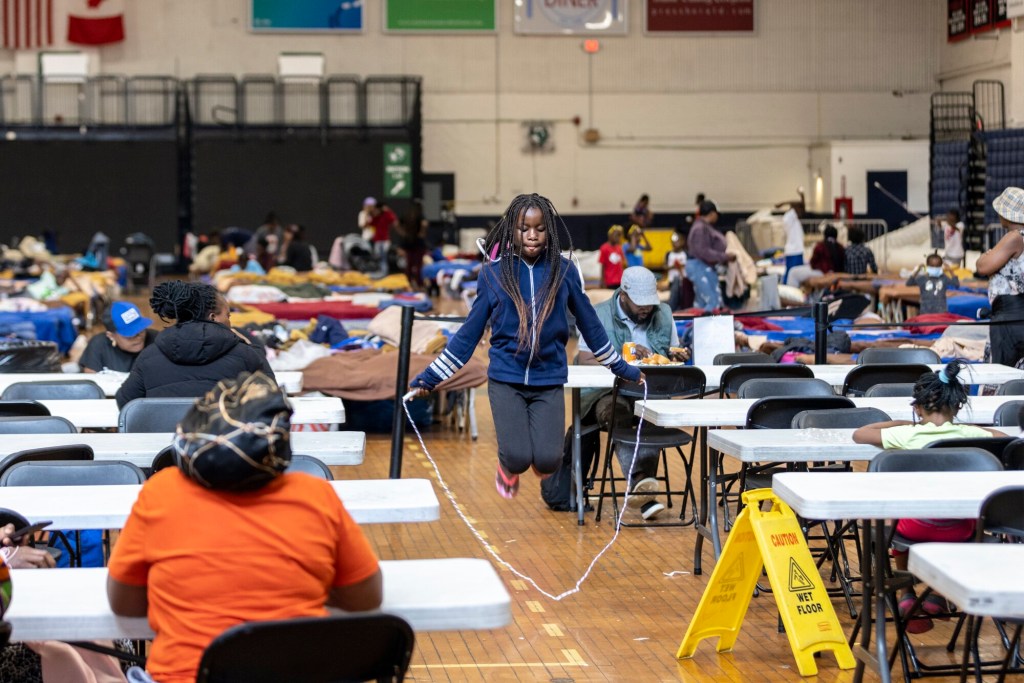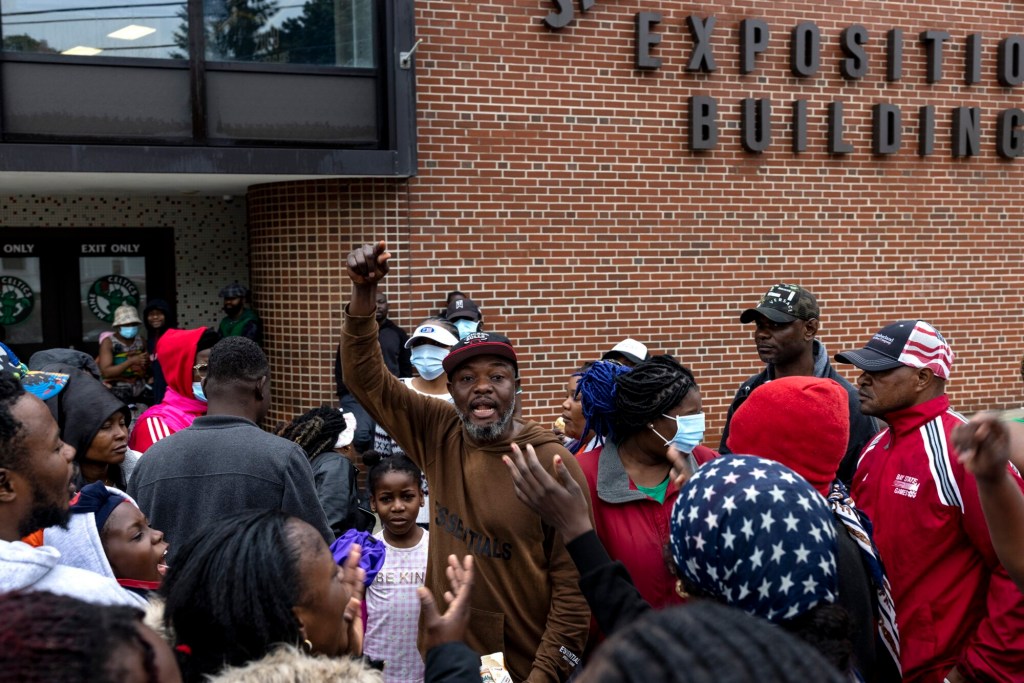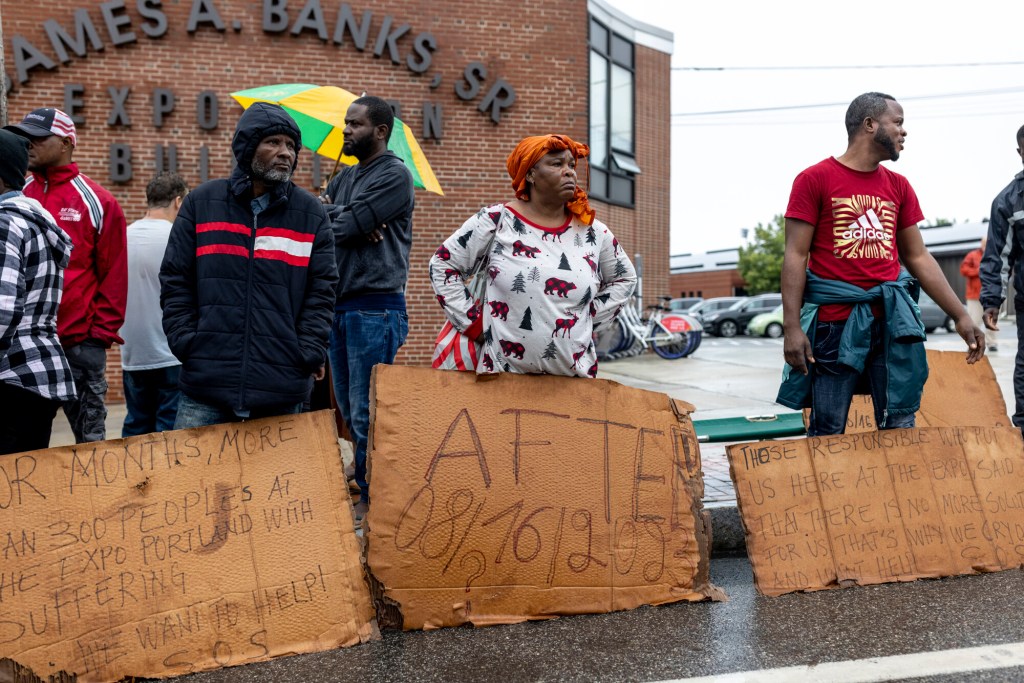Dozens of asylum seekers staying at the Portland Expo protested Wednesday over concerns about their futures and conditions inside the sports arena, temporarily closing Park Avenue and prompting a visit from city leaders who said they’re working to find long-term housing.
The Expo has been housing close to 300 people from asylum-seeking families since early April, when the city ran out of space in its two regular shelters. The temporary shelter on the gym floor is slated to close on Aug. 16.
Portland police blocked a stretch of Park Avenue during rush hour because of the protest, which started around 7 a.m. The road was reopened shortly before 9 a.m., when protesters moved from the roadway to the sidewalk in front of the arena.
About 100 asylum seekers, including children, stood outside in the rain, some holding signs and some clapping. One held a sign above his head that asked, “After the day 8/16/2023 where are we going to go?”
Another sign propped up on the ground said, “Those responsible who put us here at the Expo said that there is no more solution for us. That’s why we cry out and want help.”
Junior Francisco, 18, an asylum seeker from Angola, said people staying at the Expo also are upset that they have been served expired food and are sleeping on uncomfortable cots. But the biggest worry is about what will become of them when the Expo closes.
“They told us they don’t have a solution for us. They will leave us on the streets,” Francisco said.
“We don’t know where we are going,” said Herve Kalemat, 32, from the Democratic Republic of Congo. “It’s a big question.”
Kalemat is grateful for all the city has done for asylum seekers, but said he isn’t sure city officials are aware of their concerns. “I understand we are a lot of people here and it’s complicated. … We didn’t have an opportunity to speak with the city,” he said.
Mayor Kate Snyder, City Manager Danielle West and Director of Health and Human Services Kristen Dow arrived around 10 a.m. to meet with the group.
“I think the shelter is actually very well run,” West said after the closed-door meeting. “There were some specific issues we will try to address that I think happen pretty regularly at most of the facilities we operate. … The housing issue is a much bigger one, and that’s the majority of what we heard today.
“That’s a statewide issue and it’s something that will take a lot more partners and municipalities and levels of government other than just the city of Portland. But we will continue to work with them on that.”
To prepare for closing the Expo in August, the city stopped admitting new families weeks ago.
About 270 people are still staying there, and city officials said Wednesday that they are looking at options of where they might go after Aug. 16. One possibility would be to resurrect the host home program they used before the COVID-19 pandemic.

A young girl sweeps up the area around her cot at the Portland Expo on Wednesday. Brianna Soukup/Staff Photographer
The city, which has received more than 1,540 asylum seekers since Jan. 1, also is working with the state, the Greater Portland Council of Governments and the Developers Collaborative, a private developer, to open a 180-bed shelter for asylum seekers in Riverton. That shelter will be for individuals, not families, though, so it would not help the people staying at the Expo.
“The city has done its best to expand emergency shelter from just the Homeless Services Center and Family Shelter to an additional 300 beds here at the Expo,” Snyder said.
“There is of course some frustration about what comes next, and that’s what we had an opportunity to talk about today, is the fact that there’s a difficult housing market and we as a city are working with as many partners, including the state and federal government, as possible to work through some solutions.”
Dow said the asylum seekers, mostly from Angola and the Democratic Republic of the Congo, have asked for more culturally appropriate food. She said the city works with community partners to provide meals and the food they serve often is donated.
As for complaints of expired food, she said, “I don’t know. There might have been a loaf of expired bread or something that was donated. We work a lot with donated food. That’s something we’re absolutely actively monitoring. We have three meals per day brought in for the clients.
“We have given them tours of the facilities so they can see where their food is coming from. We brought in the food services director from Preble Street so they can talk to the clients about what they want. We’re actively working with them on that.”
Dow said the food supply and medical care have been overwhelmed by the need, not just at the Expo but in the community at large. “Unfortunately, because of the great need we have in the community, the systems are really strained,” she said.

Toto Capitao holds up a sandwich as an example of the kind of meals asylum seekers receive while staying at the Portland Expo during a protest outside of the building Wednesday. Brianna Soukup/Staff Photographer
The Expo first opened as a temporary shelter for asylum seekers in 2019 after nearly 90 people arrived in just three days. It served as an emergency shelter again in 2020, in the early days of the pandemic, though the city soon turned to hotel rooms to shelter people safely under COVID-19 restrictions.
The sports arena is open 24/7 to families registered to stay there and offers them services including health screenings and immunizations, legal aid, translators, meals and assistance in looking for housing.
Comments are not available on this story.
Send questions/comments to the editors.



